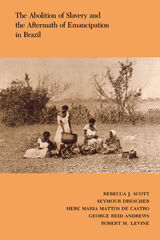
The articles presented here represent a broad scope of scholarly inquiry that covers developments across a wide canvas of Brazilian history and accentuates the importance of formal abolition as a watershed in that nation’s development.

This study envisions Tocqueville as a political man, and a politically committed one, rather than as an omniscient and solitary prophet of the age of the masses. A historical account of one of the essential liberals of the nineteenth century cannot ignore the fact that Tocqueville's views of both the present and the future were formulated in terms of the outlook of his own generation and class.
The British Isles were the source of some of Tocqueville's most significant insights, especially of the historic connection between the rise of democracy and the extension of bureaucratic centralization. They furnished him with two examples from which he eventually drew a theory of the evolution of aristocracies. They gave him a comparative basis for a theory of the relation of ideas to social change, of the causes of and antidotes to revolutions. His ideas on institutional and economic reform and on the ingredients of a great foreign policy bore the English trademark. If at times he protested against a lifeless imitation of an insolent rival, more often than not what the rival was doing became the basis for his own solutions to French problems.
Finally, England provided Tocqueville with a refuge from the intellectual and political isolation of his last years. He found there, not only the consensus which was necessary for him to grasp his own reality and purpose, but the opportunity to continue to influence the course of events, however diminished his range. At the end of his life England was his second homeland, and assumed the prime place in his vision of the history of human liberty.
A discussion of Tocqueville's intellectual relationship with his lifelong friend, Gustave de Beaumont, is indispensable to this study. Tocqueville brought to their common fund of ideas a wealth of insight which justly claims greater scholarly attention, but it was Beaumont who, after their journey to England and Ireland in 1835, attempted an extended study of the British constitution, while the ideas of his traveling companion remained in undigested notes. Despite the fact that the inseparability of their ideas on democracy was recognized a generation ago, the unity of their careers and ideas after the appearance of their books on America here receives due analysis for the first time.
READERS
Browse our collection.
PUBLISHERS
See BiblioVault's publisher services.
STUDENT SERVICES
Files for college accessibility offices.
UChicago Accessibility Resources
home | accessibility | search | about | contact us
BiblioVault ® 2001 - 2025
The University of Chicago Press









